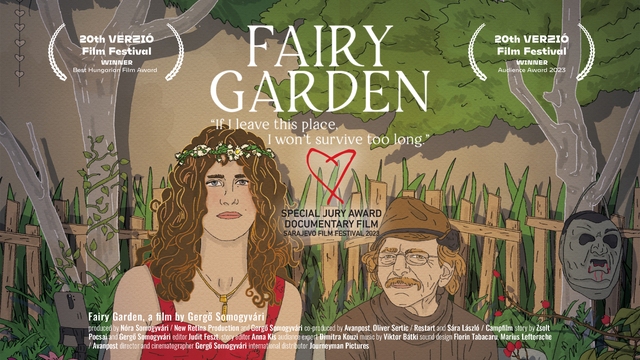The Producers

Gergő Somogyvári – Director
Gergő Somogyvári is a Budapest-based cinematographer and documentary director. After studying photography and journalism, he graduated from the University of Film and Drama (SZFE) as a cinematographer in 2008. For 14 years he has worked both in fiction and non-fiction projects as DOP and directed 5 short- and mid-length documentaries screened internationally on TV and festivals. In 2008, his experimental doc Carta Azulejo – Tile Mail received the most prestigious national award, the Main Prize of the Hungarian Film Week. Fairy Garden is his first feature-length documentary.

Nóra Somogyvári – Producer
Nóra Somogyvári is a producer and University of the Arts London Film and TV production graduate. She has collaborated with many international TV and documentary projects, and has worked in a number of Hungarian feature documentaries as a production manager, line producer and junior producer. She founded New Retina Productions in 2012. Fairy Garden is the company's first feature documentary, in co-production with Sára László, producer of Campfilm, Restarted (Croatia) and Avanpost (Romania).
Making The Film
Three years ago, a new law came out in Hungary criminalizing homelessness and forbidding rough sleeping. Together with my social worker friend, Zsolt Pocsai, I decided to make a fast and short reportage about this issue and show something to the public to counter Hungarian government propaganda. During this fieldwork we met Fanni and Laci in the woods; two minutes after I pushed the recording button on my camera, I knew this story would be something much longer and deeper. We ended up shooting for 3 and half years.
Our story is about Fanni, a rejected trans teenager who found shelter in the hut of Laci, a solitary homeless man. We were really blown away by the magic of this Fairy Garden, and it was a gift for a documentary filmmaker to be trusted us enough by Fanni and Laci to share with us their troubles, joys and emotions. During the three years that we spent together a bizarre, whimsical and convivial universe opened up for us. We felt that it was essential to preserve and pass on this unique experience.
While our film is clear observational cinema, two main conceptual elements emerged from the beginning. Firstly, we kept our story in one location, inside the Fairy Garden. It gave us a magical stage upon which we could create a strong cinematic experience. Secondly, rather than overemphasizing the politics of Fanni’s transgender identity, we wanted to focus on how Laci and Fanni try to recreate the elementary structures of life which are missing. For me it was quite shocking that in 21st century Hungary, a teenager could be kicked out onto the streets, because her parents could not stand her blooming trans identity. What really amazed me in Laci and Fanni's story was the strength of their father-daughter relationship, built from nothing in the woods with all odds against them.
This is a cinematic fairy tale where acceptance comes from the unlikeliest of places: from an old homeless man who never had the chance to learn about this issue. For me it's really a great example of humanity, something that could teach us all. I’m glad that we could immerse ourselves into this project just in time—unfortunately Laci and the Fairy Garden have disappeared, and this universe only exists now in our movie.
Gergő Somogyvári - Director
 On the outskirts of Budapest, in the heart of the woods, hides a ramshackle little hut. Inside, two social outcasts have formed the unlikeliest of bonds: Fanni, a 19 year-old transgender teenager, and Laci, a 60 year-old homeless man. Together, they form a cantankerous, convivial, makeshift family life, supporting each other as father and daughter through hardship and change. Life is tough, but it is theirs. Set on the margins of Hungarian society, this is a film about perseverance, finding home, and the triumph of acceptance.
On the outskirts of Budapest, in the heart of the woods, hides a ramshackle little hut. Inside, two social outcasts have formed the unlikeliest of bonds: Fanni, a 19 year-old transgender teenager, and Laci, a 60 year-old homeless man. Together, they form a cantankerous, convivial, makeshift family life, supporting each other as father and daughter through hardship and change. Life is tough, but it is theirs. Set on the margins of Hungarian society, this is a film about perseverance, finding home, and the triumph of acceptance.

 Sarajevo Film Festival | Special Jury Award
Sarajevo Film Festival | Special Jury Award
 Verzió Film Festival | Best Documentary
Verzió Film Festival | Best Documentary
 Verzió Film Festival | Audience Award
Verzió Film Festival | Audience Award


